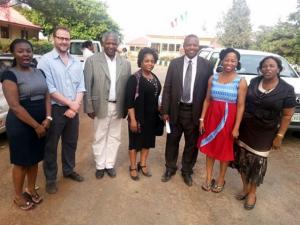Integrated Community Case Management
Malaria, Pneumonia and Diarrhea are still responsible for more than 50 percent of death among children under 5 years old in Nigeria. It is on record that majority of these children, particularly those living in hard to reach areas, die at home.
To address this unfortunate situation, WHO, UNICEF and partners are supporting the Integrated Community Case Management (iCCM) of Pneumonia, diarrhea and Malaria in many countries whereby community health workers are appropriately trained, supervised and supported with an uninterrupted supply of medicines and equipment for the identification and correct treatment of children who present with acute respiratory Infection, diarrhea and Malaria.
In Nigeria, the Federal Ministry of Health and its agencies have adopted the iCCM strategy. In order to initiate iCCM implementation, WHO supported by the Canadian Department for Foreign Affairs, Trade and Development (DFATD) is supporting Nigeria in two states to implement the strategy through the Rapid Access and Expansion (RAcE) Project. During the month of February 2014, the Project Manager of the RAcE PROJECT visited Niger State and Abia State on a monitoring visit. Accompanied by staff from WCO Nigeria, WHO/IST, State Ministry of health, Malaria Consortium and Society for Family Health, the Project Manager visited six Local iCCM will be implemented.
Some of the key findings identified during the monitoring visits to Abia and Niger states included the need to have functional Primary Health Care Facilities if iCCM for Pneumonia, Malaria and Diarrhea in Nigeria is to succeed. The functionality includes as having enough Manpower, Funds and Materials. The RAcE project will need a strong exit strategy. The role of SURE-P, NHIS may enhance sustainability of iCCM implementation in Nigeria.




